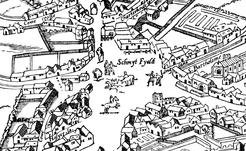 Civitas Londinum, 1561 Civitas Londinum, 1561 Like the lost River Fleet, another location in London that has long intrigued me is the infamous Smithfield market; a site of enormous contrasts: executions and extreme devotions, torture and merry-making. In the Middle Ages, Smithfield--"a smooth field" to the north of London's walls--was a natural place for jousts, tournaments, and the selling and butchering of livestock. Conveniently (!), animal waste from the market could be dumped into the River Fleet, which flowed into the Thames. It’s original origins as a place where livestock could be bought and sold, can be seen in the vestiges of its street names (e.g. Cow lane, Cock lane). 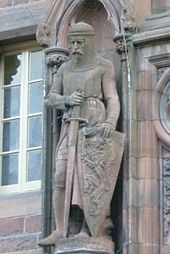 Wallace statue by D. W. Stevenson on the Scottish National Portrait Gallery, Edinburgh Wallace statue by D. W. Stevenson on the Scottish National Portrait Gallery, Edinburgh Not surprisingly, Smithfield, like most great open communal spaces was used for greatly varied purposes, including: Public torture: Over the centuries, many criminals—particularly those accused of treason—were tortured. One of the most famous was William Wallace (“Braveheart”)- - a twelfth century hero of the Scottish people. Drawing and quartered was the preferred method, and perhaps castrated as well (but studio executives probably thought movie audiences couldn’t stomach Mel Gibson undergoing that particular humiliation.) 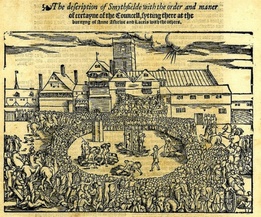 Public executions: While Smithfield was a regular site of hangings and burnings for centuries, under Queen Mary I (“Bloody Mary” to her detractors), quite a few Protestant dissenters were publicly burned as heretics. [Interesting side note: According to John Foxe’s Book of Martyrs, the “Marian Martyrs” would ask that their hands not be bound and their wood pile would consist of the greenest wood, so that their plaintive laments and prayers would last longer.) The burnings of these men and women were collectively referred to as “The Smithfield Fires.” Merry-making and Fair-going: Every August until the mid-seventeenth century, St. Bartholomew’s fair would be held at Smithfield. Originally it was supposed to be only three days of merry-making, but by the 17th century the fair was lasting over two weeks. Check out this advertisement for the entertainment to be had at the “Plow Music Booth” in 16xx: 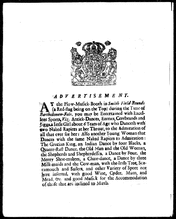 Anon (1679) Anon (1679) “At the Plow-Music Booth in Smith Field Rounds, (a Red flag being on the Top) during the Time of Bartholomew-Fair, you may be entertained with excellent sports, [such as] Antique dances, entries, cerebrands and jigs, a little girl about 6 years old who danceth with two naked rapiers at her throat, to the admiration of all that ever see her…. With good Wine, Cider, Mum and Mead, and good music for the accommodation of those who are inclined to mirth.” 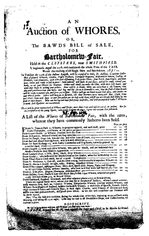 Altham, M. (1691) An auction of whores. Wing / 2858:01 Altham, M. (1691) An auction of whores. Wing / 2858:01 Or of course, for "all single men and bachelors," there was also an ongoing "auction of whores," which--as Michael Altham (1691) joked--contained, “a curious collection of painted whores, cracks, night-walkers, newgate-nappers, bridewell-workers, ladies of pleasue, cart-dancers; with other such dissembling pick-pocket cheats, some pox’d, some clap’d, and some quite rotten and ready to fall in pieces.” Underlying this bill, however a real fear of disease and pollution that seemed to occur whenever so many people were brought in such close proximity. King Charles I tried to cease the Fair on several occasions during his reign. In 1637, he issued a proclamation for putting off the Bartholomew Fair, and a similar fair in Southwark: 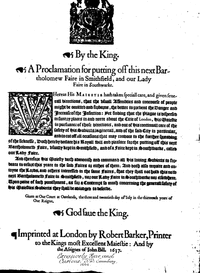 Printed by Robert Barker, 1637 Printed by Robert Barker, 1637 “Whereas his Majesty hath taken special care and given several directions, that the usual assemblies and concourse of people might be omitted and forborne, the better to prevent the danger and increase of the infection: Yet finding that the plague is dispersed in sundry places in and near the City of London, his majesty in pursuance of those direction and out of his continual care of the safety of his subjects in general, and of the said city in particular, and to cut off all occasions that may conduce to the further spreading of the sickness, doth hereby declare his royal will and pleasure for the putting off this next fair…” This was only a temporary halt to such festivities; only Cromwell was able to completely stop the fun. The Fair, like all other such festivals, was banned under his regime, only to be restored in 1666 with the Restoration of the fun-loving Charles II. 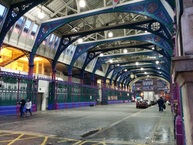 Smithfield Market today (credit: Greg Light) Smithfield Market today (credit: Greg Light) Today, there is little indication of the mass executions and torture that occurred here, although Smithfield Market—now called the Central London Market—is the largest of its kind in London, and one of the largest in all of the European Union. But like the River Fleet, the Smithfield grounds are another part of secret London.
1 Comment
|
Susanna CalkinsHistorian. Mystery writer. Researcher. Teacher. Occasional blogger. Categories
All
Archives
May 2023
|
 RSS Feed
RSS Feed